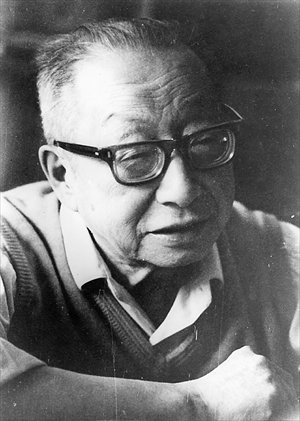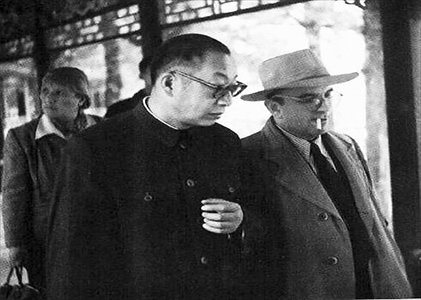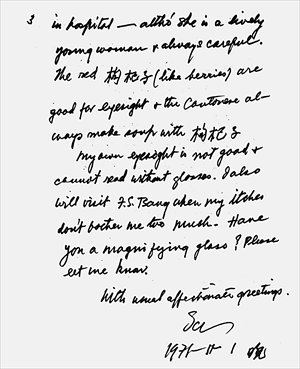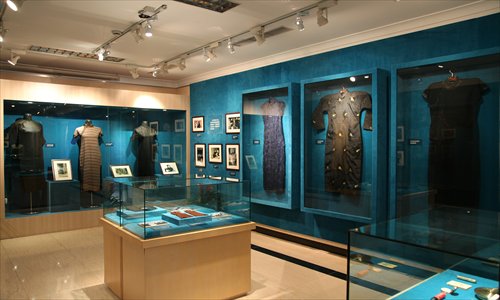Burn after reading





One would imagine that the friendships which endured and survived the torments of the Cultural Revolution (1966-76) would triumph under any circumstances. And the long-lasting friendship between Soong Ching Ling (1893-1981), the wife of Sun Yat-sen, and Chen Hansheng (1897-2004), a pioneer of modern Chinese social science would appear to be a perfect example of this.
It was a relationship that began when the two first met in Moscow in 1927, and which lasted until Soong's death more than half a century later. Soong famously saved the life of Chen during the chaos of the Cultural Revolution.
Indefinitely detained
Even before the founding of the People's Republic of China in 1949, Chen was already widely known for his work in various fields. However, his accomplishments were turned against him in the late 1960s, and he was indefinitely detained by the authorities. Soong implored Zhou Enlai to intervene in Chen's case and after nine months in prison his sentence was deferred to hard labor in Hunan Province, where at least he was able to teach.
2013 is the 120th anniversary of Soong Ching Ling's birth and 159 letters from her to Chen dating from 1971 to 1981 have been compiled into a book, Letters from Soong Ching Ling to Chen Hansheng (1971-1981), recently published by the China Welfare Institute.
The letters were all made available by Chen's niece, Tong Yuqiong, to the institute. And at almost the same time A Selection of Letters between Soong Ching Ling and Israel Epstein containing 265 letters from 1941 to 1981 has also been published.
Soong's sole authorized biographer, Epstein (1915-2005) was a Polish-born journalist and writer who became one of the few overseas-born Chinese citizens to spend almost his whole life in China, becoming a member of the Communist Party of China in the process. The majority of these letters were made available by Epstein's second wife, Huang Huanbi.
"The publishing of Soong's correspondence with her close friends is a real breakthrough in our research about her life," said Shen Haiping, who acted as deputy editor for the publication of the letters between Soong and Chen.
Shen told the Global Times that research into Soong started in the 1990s with the founding of the Shanghai Soong Ching Ling Study Association.
Sketchy details
However, Shen admits that, despite their efforts, knowledge of Soong's life is still sketchy.
"Soong liked to write letters to her friends and through these letters we can learn more about her true nature and personal life, and not just the official image of her as a first lady. However, from the 1990s until now, the association only acquired and published three collections of Soong's letters to different friends," added Shen.
Shen said that the difficulty in recovering many of the letters isn't hard to fathom when one recalls what Soong wrote at the bottom of most correspondence she sent out: "destroy/burn after reading." This advice was followed strictly by most of her friends.
"I believe she did this to protect herself and also her friends, especially during the Cultural Revolution," said Shen. "For example, Jin Zhonghua (1907-68, the deputy mayor of Shanghai from 1952 to 1967) committed suicide when he realized that letters to him from Soong had been found by Red Guards. He blamed himself for not destroying them sooner. This also explains why we only have letters between Chen and Soong from 1971; before that they were all destroyed."
To protect herself further, Shen points out, Soong wrote most of her letters in English including all of those to Chen and Epstein. The letters have now been printed with Chinese translations.
Gender equality
The contents of the correspondence between Soong and Chen mainly revolve around gender equality and the emancipation of women. Some of the letters discuss Chen's life and his health.
The letters between Soong and Epstein mainly discuss the events of 1938 to 1941 when Epstein first joined the China Defence League, an organization set up by Soong in Hong Kong. During these three years, Epstein helped Soong to publish 36 issues of the league's journals, all of which have now been reproduced in print.
In order to commemorate the anniversary of Soong's birth, there are also two ongoing exhibitions in Shanghai. The Soong Ching Ling Memorial Residence in Shanghai (1843 Huaihai Road Middle, 6474-7183) is displaying many of the former first lady's dresses, while the Sun Yat-sen Memorial Residence (7 Xiangshan Road, 5306-3361) is staging an exhibition about her life and times.
Mai Lingzhi, director of the department of cultural relics and materials at the Soong Ching Ling Memorial Residence told the Global Times that Soong led a "simple and unadorned life. She liked to wear qipao most of the time and which she adjusted herself to fit better. In later years, when she put on weight, she liked to wear flared pants."